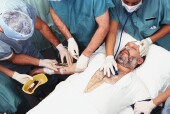- Could Your Grocery Store Meat Be Causing Recurring UTIs?
- Are You Making This Expensive Thermostat Error This Winter?
- Recognizing the Signs of Hypothyroidism
- 10 Strategies to Overcome Insomnia
- Could Artificial Sweeteners Be Aging the Brain Faster?
- Techniques for Soothing Your Nervous System
- Does the Water in Your House Smell Funny? Here’s Why
- Can a Daily Dose of Apple Cider Vinegar Actually Aid Weight Loss?
- 6 Health Beverages That Can Actually Spike Your Blood Sugar
- Treatment Options for Social Anxiety Disorder
Influx of Trainee Docs in July Doesn’t Affect Stroke Care: Study

People who suffer strokes in July — the month when medical trainees start their hospital work — don’t fare any worse than stroke patients treated the rest of the year, a new study finds.
Researchers investigating the so-called “July effect” found that when recent medical school graduates begin their residency programs every summer in teaching hospitals, this transition doesn’t reduce the quality of care for patients with urgent medical conditions, such as stroke.
“We found there was no higher rate of deaths after 30 or 90 days, no poorer or greater rates of disability or loss of independence and no evidence of a July effect for stroke patients,” said the study’s lead author, Dr. Gustavo Saposnik, director of the Stroke Research Center of St. Michael’s Hospital, Toronto, in a hospital news release.
For the study, published recently in the Journal of Stroke and Cerebrovascular Diseases, the researchers examined records on more than 10,300 patients who had an ischemic stroke (stroke caused by a blood clot) between July 2003 and March 2008. They also analyzed length of hospitalization, referrals to long-term care facilities and need for readmission or emergency room treatment for a stroke or any other reason in the month after their discharge.
Strokes, a leading cause of death and disability worldwide, require immediate and expert medical treatment. More than 50 percent of all strokes are treated in teaching hospitals, the study’s authors noted. They suggested the lack of training among new residents in July may be offset by the fact that stroke patients are treated by a multidisciplinary team of specialists.
“Stroke teams usually include an emergency physician’s initial assessment, a neurologist, neuroradiologist, [physical] therapists, occupational therapist, nurse and dietitian, so the addition of new personnel may have less of an effect with strokes compared to other health issues,” said Saposnik.
The researchers also speculated that the July effect may not be noticeable after a month.
“Thirty days after a stroke, any July effect may have already leveled off. More research is needed to understand the possible impact of less-experienced care during the initial moments of stroke management to be sure no July effect is at play at any point of stroke care,” said Saposnik. “Interestingly, we found that ischemic stroke patients admitted in July were less likely to receive clot-busting drugs or be admitted to stroke units, but ultimately patients did just as well regardless of the month.”
Previous studies have examined the July effect on other health issues, such as heart surgery, orthopedic surgery and care for premature babies. In these cases, researchers found 4 to 12 percent higher death rates in July, the new release says.
More information
Harvard Medical School provides more on the “July effect.”
Source: HealthDay
Copyright © 2026 HealthDay. All rights reserved.










